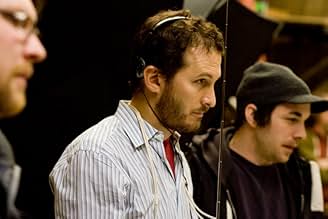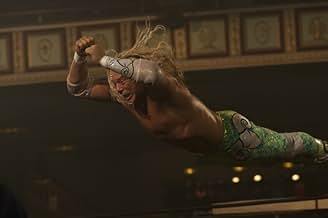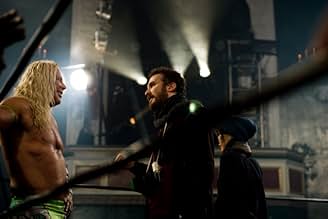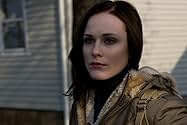Un luchador profesional tiene que retirarse de la lucha, pero sus intentos de forjarse una vida fuera del ring le saben a poco.Un luchador profesional tiene que retirarse de la lucha, pero sus intentos de forjarse una vida fuera del ring le saben a poco.Un luchador profesional tiene que retirarse de la lucha, pero sus intentos de forjarse una vida fuera del ring le saben a poco.
- Nominado a 2 premios Óscar
- 58 premios ganados y 93 nominaciones en total
Dylan Keith Summers
- Necro Butcher
- (as Dylan Summers)
- Dirección
- Guionista
- Todo el elenco y el equipo
- Producción, taquilla y más en IMDbPro
Opiniones destacadas
As someone who's a fan and who has actually worked behind the scenes in pro wrestling, I can tell you that Randy "The Ram" Robinson's story is a very respectful and realistic portrayal of the toll pro wrestling takes on its stars' lives. Certainly not everyone in the biz ends up as destitute and lonely as Randy was - some do, definitely - but those who end up well-off in every sense of the word (like Hulk Hogan, John Cena, Stone Cold Steve Austin, and The Rock, for instance) are VERY, VERY rare. Most end up somewhere in between.
Interestingly, as precarious as Randy's health became, however, if he were in his mid-50's (as was Mickey Rourke at the time), he still had a longer pro wrestling career than many others who abused their body likewise. Randy still was made up of some very tough stuff and in fact beat the odds with his career length.
When asked "is pro wrestling fake?", I always answer, "only where it needs to be" - i.e., the story lines and SOME of the action. No one deliberately sets out to end another one's career, but like any other contact sport such as pro football, the athleticism and subsequent pain & injury are all TOO real. There's no "off season" in pro wrestling, and certainly no astronomically high salaries as other pro athletes make - not by a long shot. But in pro wrestling you'll find the best athletes in the world.
Bottom line: It's a brutal business and an extremely hard way to make a living - period. That's why the men and women who stick with it and suffer all they do is for one reason only - because they love it. May God bless them all. :)
Interestingly, as precarious as Randy's health became, however, if he were in his mid-50's (as was Mickey Rourke at the time), he still had a longer pro wrestling career than many others who abused their body likewise. Randy still was made up of some very tough stuff and in fact beat the odds with his career length.
When asked "is pro wrestling fake?", I always answer, "only where it needs to be" - i.e., the story lines and SOME of the action. No one deliberately sets out to end another one's career, but like any other contact sport such as pro football, the athleticism and subsequent pain & injury are all TOO real. There's no "off season" in pro wrestling, and certainly no astronomically high salaries as other pro athletes make - not by a long shot. But in pro wrestling you'll find the best athletes in the world.
Bottom line: It's a brutal business and an extremely hard way to make a living - period. That's why the men and women who stick with it and suffer all they do is for one reason only - because they love it. May God bless them all. :)
Enough has been written already about Mickey Rourke's real-life parallels with his fictional character in The Wrestler. Yes, it makes the story seem even realer, and is perhaps what attracted Rourke to the project. (Or perhaps not perhaps, instead, it is what attracted Darren Aronofsky to the actor.) But to focus on such surface similarities seems like an undermining of his work here. Rourke may not be as out-of-his-comfort-zone as Sean Penn in Milk, the only other Oscar-worthy lead performance this year, but that is merely a testament to his fundamental understanding of his character: Randy is an understated guy with big scars, both literally and figuratively. He's been wrestling for years now reduced to borderline tribute shows in front of dwindling crowds, scrounging up barely enough cash to buy the variety of drugs and steroids he needs to maintain his weight. He lives in a trailer park and gets locked out for not being able to keep up rent. He works part-time at a grocery store and visits strip clubs regularly, because it's the only place where he seemingly has any meaningful connections with another human being namely the dancer Cassidy (played by Marisa Tomei), who is similarly a bit older than most peers in her "profession," yet doesn't really know any other way to live.
The Wrestler draws immediate comparison to the classics of working class cinema, including Rocky and On the Waterfront. Sylvester Stallone returned to his iconic character two years to bring resolution to the life of Rocky Balboa, the Philly boxer who got back in the ring for one final match . It was a good film and touched on similar themes a nice guy stuck in a mean world, an estranged child and ultimately both films present us with the dilemma these men find themselves in: too old to continue doing what they know best, and too old to learn how to do anything else.
Whereas Rocky Balboa was a trip down memory lane, it was hardly as bleak or frank as The Wrestler, which is a vastly superior film. Darren Aronofsky has established himself with this picture as one of the most important of modern American filmmakers; to acknowledge that this work is from the same man who directed The Fountain is astonishing, because they couldn't be farther apart on a sylistic level. The Wrestler is grainy, low-key and rough. It isn't polished, fantastical or elaborate. And that suits the material perfectly. The fact that Aronofsky was willing to almost entirely reinvent his approach for the benefit of the story is more than admirable. He deserves a nomination.
Tomei is wonderful in her supporting role, fleshing out her character (again, both literally and figuratively) with greater competence than most actresses would probably be able to manage, because it's a fairly obvious role the "stripper with a heart of gold" who is the object of desire for the gruff guy with a tortured soul. Yet she manages to strike a balance in the film as one of two female roles, the other belonging to Evan Rachel Wood as Randy's emotionally severed daughter.
The Wrestler is impressive for all its smaller parts as well as the larger ones. When Randy goes to visit his daughter, the reaction is fleeting; it's not overly dramatic and revelatory, like most films of this nature often create such scenes to be. We can tell by her reaction that it's not the first time Randy has attempted to reconcile with her, as she seems unfazed by his appearance on her doorstep. It is in this fashion that the film jumps through all the mandatory hoops of its genre (think, of all things, The Royal Tenenbaums), yet still manages to seem fresh and realistic.
And then there's Rourke. As aforementioned, he deserves the Oscar nom he's likely to receive. And he should probably win. This is one of the best performances of the decade, perhaps even of all time, if we really want to get down to it. It's the best work of his career, at once the most fully developed of his characters and the most imperfect. Randy isn't airbrushed to make him seem more appealing to the audience; Aronofsky and Rourke exploit his faults and present him as a normal man, tempted by vices and haunted by his past. Yet we recognize that the drugs, the empty sex and the generally self-destructive behavior Randy partakes in is rooted in the same emotional enguish that the actor himself seems to carry with him; Aronofsky spotted this quality in Rourke, and he fought the producers for Rourke over their first choice (Nicolas Cage), and his dedication paid off you'll be hard-pressed to find a more convincing, moving or memorable lead performance this year.
Ultimately, The Wrestler is one of the year's very best films a character study that is at once timeless and powerful. And it's helmed by a director who has managed to bounce back from an aesthetically pleasing but shallow art-house film to produce one of the great works of American cinema in the 21st century.
The Wrestler draws immediate comparison to the classics of working class cinema, including Rocky and On the Waterfront. Sylvester Stallone returned to his iconic character two years to bring resolution to the life of Rocky Balboa, the Philly boxer who got back in the ring for one final match . It was a good film and touched on similar themes a nice guy stuck in a mean world, an estranged child and ultimately both films present us with the dilemma these men find themselves in: too old to continue doing what they know best, and too old to learn how to do anything else.
Whereas Rocky Balboa was a trip down memory lane, it was hardly as bleak or frank as The Wrestler, which is a vastly superior film. Darren Aronofsky has established himself with this picture as one of the most important of modern American filmmakers; to acknowledge that this work is from the same man who directed The Fountain is astonishing, because they couldn't be farther apart on a sylistic level. The Wrestler is grainy, low-key and rough. It isn't polished, fantastical or elaborate. And that suits the material perfectly. The fact that Aronofsky was willing to almost entirely reinvent his approach for the benefit of the story is more than admirable. He deserves a nomination.
Tomei is wonderful in her supporting role, fleshing out her character (again, both literally and figuratively) with greater competence than most actresses would probably be able to manage, because it's a fairly obvious role the "stripper with a heart of gold" who is the object of desire for the gruff guy with a tortured soul. Yet she manages to strike a balance in the film as one of two female roles, the other belonging to Evan Rachel Wood as Randy's emotionally severed daughter.
The Wrestler is impressive for all its smaller parts as well as the larger ones. When Randy goes to visit his daughter, the reaction is fleeting; it's not overly dramatic and revelatory, like most films of this nature often create such scenes to be. We can tell by her reaction that it's not the first time Randy has attempted to reconcile with her, as she seems unfazed by his appearance on her doorstep. It is in this fashion that the film jumps through all the mandatory hoops of its genre (think, of all things, The Royal Tenenbaums), yet still manages to seem fresh and realistic.
And then there's Rourke. As aforementioned, he deserves the Oscar nom he's likely to receive. And he should probably win. This is one of the best performances of the decade, perhaps even of all time, if we really want to get down to it. It's the best work of his career, at once the most fully developed of his characters and the most imperfect. Randy isn't airbrushed to make him seem more appealing to the audience; Aronofsky and Rourke exploit his faults and present him as a normal man, tempted by vices and haunted by his past. Yet we recognize that the drugs, the empty sex and the generally self-destructive behavior Randy partakes in is rooted in the same emotional enguish that the actor himself seems to carry with him; Aronofsky spotted this quality in Rourke, and he fought the producers for Rourke over their first choice (Nicolas Cage), and his dedication paid off you'll be hard-pressed to find a more convincing, moving or memorable lead performance this year.
Ultimately, The Wrestler is one of the year's very best films a character study that is at once timeless and powerful. And it's helmed by a director who has managed to bounce back from an aesthetically pleasing but shallow art-house film to produce one of the great works of American cinema in the 21st century.
Very rarely an artistic come back is so pointed, so truthful and/or so honest. Mickey Rourke is extraordinary here and I can assure you, he'll break your heart. "It's not over until you (pointing at the audience) tell me its over" Who was saying that? Mickey Rourke himself or his character? Both, I think both. I felt a chill run down my spine, the kind of chill you feel when confronted by an unvarnished truth. Darren Aronofsky is definitely someone to watch and to follow. His characters face limit situations and he finds torturous paths for them to travel. What makes the whole thing endurable is the unmistakable signs of self awareness. In "The Wrestler" the painful meeting between Ram and his daughter (played by Evan Rachel Wood) have the overwhelming weight of the truth without a hint of sentimentality. As we are approaching Oscar season I imagine already a fight to the finish between Sean Penn for "Milk" and Mickey Rourke for "The Wrestler" They both deserve the highest accolade. What a year!
Mickey Rourke returns to the big screen in Darren Aronofsky's brilliant character study, The Wrestler. Mickey Rourke gained about 35 pounds of muscle to play Randy 'The Ram' Robinson and looks the part of an old beaten down wrestler. Aronofsky creates a cold atmosphere that leaves the audience feeling as old and depressed as Rourke's character. The Wrestler doesn't have the look or feel of any previous Aronofsky film, it is mainly hand-held and has a gritty look to it that gives it a documentary feel. This film sucked me in. I really felt for the main character. I felt his pain and anger throughout the film. I felt his desperation. When a film has you reflecting the emotions expressed on the screen then it has accomplished something. I also appreciated that the story focused on two professions that are frowned upon in society, that being professional wrestling and stripping. Both professions are linked in the film and has the audience realize how similar they are. We also see the hardship of carrying out such a profession. I really enjoyed this film and had the pleasure of meeting the director after the showing. I was most impressed with him and can't wait till this film gets released.
It's no coincidence that Mickey Rourke is responsible for the comeback performance of the year if not the decade. Rourke's life and tumultuous past parallel Randy "The Ram" Robinson's own life so eerily close it becomes clear that no one else could have ever played this role. Darren Aronofsky's fourth feature is not only his most intimate but also his most accomplished to date. Aronofsky offers his most simplistic film both visually and narratively and ends up creating a film that has more depth and layers to it than any of his previous films.
Everything about Randy's life is in a state of decay. He retains a body that is on the verge of collapse, he hasn't seen his only daughter in years, financially he is exhausted, and the only thing that brings him solace in life is the same thing that threatens to end it. The most effective aspect of Randy's character is that no matter what mistakes he might have made in the past his sense of regret is so strong and genuine that it is impossible not to forgive him. As beaten down and alone as Randy might be he never looses his fighting spirit or sense of hope, no matter how little it may be. Regardless what hardship Randy is confronted with he never retreats and is admirably courageous even if being courageous might not be the smartest settlement.
For the general public who tend to find professional wrestling laughable and are quick to judge as a form of entertainment rather than a sport will find a deadly adversary in Aronofsky. The Wrestler shows that while outcomes of matches may be fixed the physical tolls these men take on their body are often more extreme and long lasting than most other "respectable" sports. The fact that Randy gives so much of himself and is ridiculed from everywhere to the trailer park he lives in to the job he keeps while not in the ring, makes us even more empathetic to the struggle Randy goes through to try and make it back on top. Overall The Wrestler is a constantly engaging and compelling character study with some of the finest acting, writing, directing I have seen in recent years. Oh and I forgot, the last shot will leave you speechless.
Everything about Randy's life is in a state of decay. He retains a body that is on the verge of collapse, he hasn't seen his only daughter in years, financially he is exhausted, and the only thing that brings him solace in life is the same thing that threatens to end it. The most effective aspect of Randy's character is that no matter what mistakes he might have made in the past his sense of regret is so strong and genuine that it is impossible not to forgive him. As beaten down and alone as Randy might be he never looses his fighting spirit or sense of hope, no matter how little it may be. Regardless what hardship Randy is confronted with he never retreats and is admirably courageous even if being courageous might not be the smartest settlement.
For the general public who tend to find professional wrestling laughable and are quick to judge as a form of entertainment rather than a sport will find a deadly adversary in Aronofsky. The Wrestler shows that while outcomes of matches may be fixed the physical tolls these men take on their body are often more extreme and long lasting than most other "respectable" sports. The fact that Randy gives so much of himself and is ridiculed from everywhere to the trailer park he lives in to the job he keeps while not in the ring, makes us even more empathetic to the struggle Randy goes through to try and make it back on top. Overall The Wrestler is a constantly engaging and compelling character study with some of the finest acting, writing, directing I have seen in recent years. Oh and I forgot, the last shot will leave you speechless.
¿Sabías que…?
- TriviaDue to the film's modest budget, Axl Rose donated the use of Guns N' Roses' "Sweet Child O' Mine" free of charge for the final match.
- ErroresThe promoter mentions that Ram's match with Tommy Rotten will be for "the strap", which refers to a promotion's title belt. However, following Ram's victory over Rotten, he is not seen holding a title belt or announced as the new champion.
- Citas
Randy 'The Ram' Robinson: The only place I get hurt is out there. The world don't give a shit about me.
- ConexionesFeatured in At the Movies: Summer Special 2008/09 (2008)
- Bandas sonoras(Bang Your Head) Metal Health
Written by Frankie Banali, Carlos Cavazo, Tony Cavazo, and Kevin DuBrow
Performed by Quiet Riot
Courtesy of Hands On Productions, LLC
Selecciones populares
Inicia sesión para calificar y agrega a la lista de videos para obtener recomendaciones personalizadas
- How long is The Wrestler?Con tecnología de Alexa
- Is "The Wrestler" based on a book?
- Does this film portray professional wrestling as fake or real?
- What is Randy's fate at the end of the movie?
Detalles
Taquilla
- Presupuesto
- USD 6,000,000 (estimado)
- Total en EE. UU. y Canadá
- USD 26,238,243
- Fin de semana de estreno en EE. UU. y Canadá
- USD 202,714
- 21 dic 2008
- Total a nivel mundial
- USD 44,734,660
- Tiempo de ejecución1 hora 49 minutos
- Color
- Mezcla de sonido
- Relación de aspecto
- 2.39 : 1
Contribuir a esta página
Sugiere una edición o agrega el contenido que falta

Principales brechas de datos
What is the streaming release date of El luchador (2008) in Canada?
Responda





































